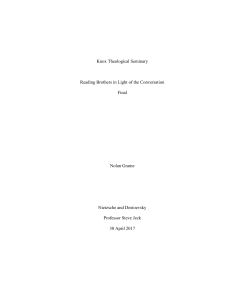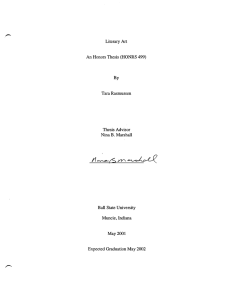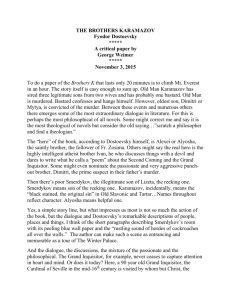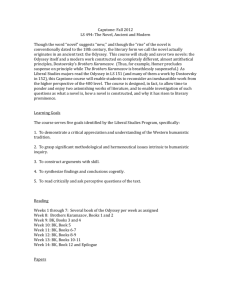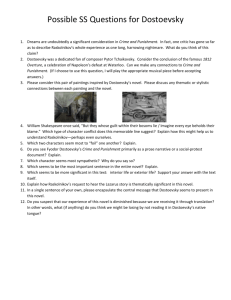Reading Brothers Karamazov in Light of the Great Conversation (1)
advertisement
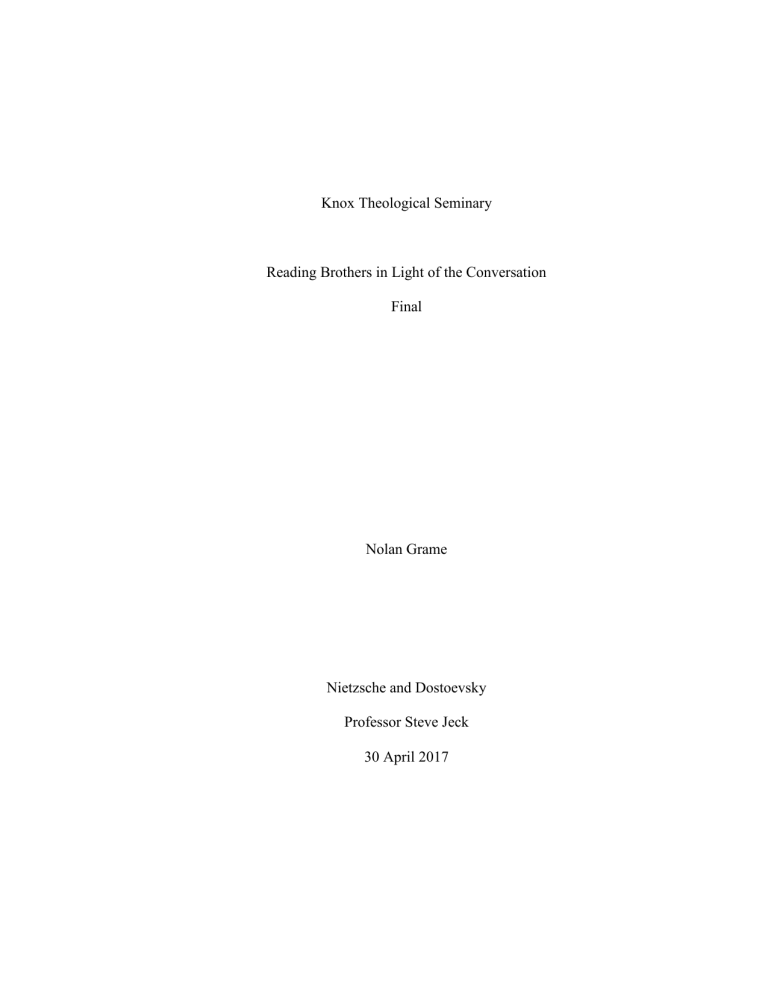
Knox Theological Seminary Reading Brothers in Light of the Conversation Final Nolan Grame Nietzsche and Dostoevsky Professor Steve Jeck 30 April 2017 Grame 2 Reading Brothers in Light of the Conversation How powerful is a line? On paper, two small lines mark the difference between immorality and immortality. On the road, a dashed line marks the difference between life and death. Plato drew a line that would define all time. His Dividing Line runs as a golden thread through the Great Conversation, defining the quarrel between poets and philosophers, determining the rule of Princes, and dictating the rule of governments. Through it, the soul is exposed, genres take shape, virtue is defined, and eternal tales are birthed. Plato’s Dividing Line houses images and materials below, and looks to ideas and knowledge above.1 A vision of life below the line is materialistic and temporal. A vision of life above the line expects more. When the phrase “above the line” is used, it will refer to life below lived in reference to what exists above. In preface, it must be noted that more has been spoken in the Conversation than I’ve heard; more heard than I’ve understood; and more understood than there’s room to say. Equally, what I’ll say about Dostoevsky’s Brothers, while I think faithful, certainly barely scratches the surface of all he means. The Brothers Karamazov is a world created by the interplay of two competing visions; these visions find their boundaries marked by Plato’s Dividing Line, with the world below the line brewing a “vision of laceration,” and a world above the line crafting a “vision of all.” Dostoevsky views the second as the remedy to the first, and education as the process by which the healing occurs. A Vision of Laceration The Brothers Karamazov drama calls upon the Great Conversation for cues and images of life below the line; these become embodied by the characters as they participate in what I’ll call a vision of laceration. Dostoevsky uses the phrase ‘laceration’ to describe a state of being contrary to ideal love. The term is from the Russian verb “nadryvat” which means, “to rupture, to strain (as by 1 Plato, and Allan Bloom. The Republic of Plato. United States of America: Basic Books, a member of the Perseus Books Group, 1991. Pg. 190. Grame 3 lifting too heavy a load).”2 In an ideal state of love, man helps man, and a burden is carried. When this fails, a relationship is broken, a burden is unmoved, and man is wounded; this is a state of laceration. The vision of laceration proceeds from life below Plato’s Dividing Line, that is, from a vision of existence merely ‘under the sun.’ Below the line, one does not seek a god above, follow a pattern established in the heavens, nor seek wisdom from on high; one is one’s own god, follows that which is profitable, and wisdom is the merely the same. Consider the Karamazov family. Fyodor Pavlovich is described early in the novel as “always of a voluptuous temper, and ready to run after any petticoat on the slightest encouragement.”3 He abandoned Dmitri as a child, “simply because he forgot him.”4 He “gathered loose women into his house, and carried on orgies of debauchery in his wife’s presence,” and then when his second wife had died, he couldn’t show where she was buried, since he had never visited the grave since throwing dirt on her coffin.5 As his own god, he sought to turn every whim of passion into personal pleasure. As such, he often was angry, drank his days away, had broken relationships with the opposite sex, and had little memory of them when they could no longer provide him benefit. His life lived below the line cast a dark shadow; the shade of laceration blacked his relationships, endeavors, and soul. Plato noted three aspects of the soul, the noetic, thymotic, and epithymotic. Fyodor was largely an epithymotic man, the aspect of the soul characterized by the table and the bed. The corresponding virtue to this aspect of the soul, moderation, was never attained. Life below the line does not promote, but rather contends with the classical and Christian virtues. A man who is his 2 Terras, Victor. A Karamazov companion: commentary on the genesis, language, and style of Dostoevsky's novel. Madison: University of Wisconsin Press, 2002. Pg. 82. 3 Dostoyevsky, Fyodor, Constance Black Garnett, and Ralph E. Matlaw. The brothers Karamazov: backgrounds and sources: essays in criticism. New York: Norton, 1976. Pg. 3. 4 Ibid., 5. 5 Ibid., 8, 16. Grame 4 own god is rarely moderate, rarely courageous, rarely wise (except to self-promotion), rarely just; and his faith, hope and love both begin and end in himself. Plato went on to describe the soul writ large, and detailed three good governments, and three corrupt. The tyranny, oligarchy, and democracy are corrupt because they are ruled for the personal gain of those in power. I am beginning to describe Augustine’s City of Man. This is the city of self-love and man’s wisdom; it is ruled by the lust of domination and despises God; it relies on self and seeks the praise of men; it lives according to its sinful nature and utilizes pride unto exaltation. This is the city that arises from life below the line, a life cut off from the Divine. This is the City of Laceration, the City into which all are born, and the City in which many in The Brothers live. Dmitri is very much an appetitive man, raised in the image of his father, Dionysus, as regards women and drink. He is betrothed to Katerina, but gets entangled with an initially profoundly dark creature, the whore Grushenka, and ultimately pursues her instead. Why was he so ill-contented with Katerina? The answer is the same as to why Fyodor pursued so many women, drank so much, and never cared enough to remember a grave. It is also the same as to why Tocqueville describes America as a restive nation. The restiveness of the Karamazovs and democracies is characteristic of life below the line, and is due to a hunger for satisfaction pursued in varied and many- but always false and fruitless- ways. All men seek happiness, but a vision of life below the line provides only fleeting options: wine wears off, women grow old, and riches are stolen, rust, and lose their luster when viewed from six feet below. The appetitive man is most prone to this life of restiveness, though none can escape it until they seek above the line. One will recall that there was no rest in Dante’s Inferno or Purgatorio, for Dante said in Purgatory, “Man’s heart, I saw, could never rest down there.”6 The stressed search for personal happiness at all costs 6 Alighieri, Dante, and Mark Musa. Purgatory. New York, NY, U.S.A.: Penguin Books, 1985. Pg. 205. Grame 5 can result in strained relations. Dmitri sought this satisfaction in an obsessive manner resulting in a competition between father and son, a battle for a whore which pitted money against strength. His craving for satisfaction reached such a frenzy that he wanted to kill his father for 3,000 rubles, and did nearly kill Grigory, all to chase one more fleeting possibility of fulfillment in a dream-life with Grushenka. In many ways, the plotting and planning, breaking of betrothal promises, and the cruelty of Dmitri recalls Machiavelli who encouraged Princes to rape Fortuna, said that a Prince never lacks reasons to break a promise, and encouraged ‘cruelty well-used.’7 Such self-concern, at the expense of others, in the pursuit of personal happiness, produces severe isolation. Isolation is at once the chief symptom and cause of laceration. The world’s natural state is the war of all against all. This classical diagnosis results in unceasing struggle in which the “strong do what they can, and the weak do what they must.”8 Dostoevsky understands this power struggle and crafts his characters and narrative to express such tension and destruction. Ilyusha is captured inquiring, “’Dad, are the rich people stronger than anyone else on earth?’ [Dad:] ‘There are no people on earth stronger than the rich.’”9 Grushenka plays with the hearts of all she encounters; she tempts and torments both Dmitri and his father, and after having feigned friendship with Katerina, powerfully shames her. Dmitri exerts his power over the lowly Mr. Snegiryov in the marketplace, and the young boys follow this pattern by asserting their power of the sickly Ilyusha. Mr. Snegiryov expectedly begins to ‘do what he must,’ falling into the pattern of shame common to the weak, and says, “for the last half of my life I’ve learned to say ‘sir.’ It’s a word you use when you’ve come down in the world.”10 Ilyusha feels the weight of 7 Machiavelli, Niccolò , Peter E. Bondanella, and Mark Musa. The portable Machiavelli. London: Penguin, 2005. Pg. 130, 134, 162. 8 T., Strassler, R. B., & Crawley, R. (2008). The landmark Thucydides: a comprehensive guide to the Peloponnesian War. New York: Free Press. Pg. 352. 9 Dostoevsky, Brothers, 189. 10 Ibid., 182. Grame 6 shame as well and visualizes an opportunity of vengeance. He imagines having a sword at Dmitri’s neck and exclaiming, “I could kill you, but I forgive you, so there!”11 These words would act to transfer the shame of the weak to the powerful. The war of all against all finds itself not only expressed in tensed relationships, in the schoolyard, and in the market place, but also in the monastery. Father Zosima is revered and treated as a kind of holy mystery, visited by many and sought for wisdom. Father Ferapont, however, has not fallen under his spell. At the first stench of death, he takes opportunity to cast seeds of faction within the monastery, disgracing the recently deceased elder in a frenzy of spiritually charged accusations. In Dmitri’s interrogation, he works towards a footing of equality with the investigators, psychologically falling in and out of such a state, and finally falling into a cemented state of shame by the stripping of his clothing. The war of all against all pits brother against brother, child against child, Father against Father, man against man. It is a topsy turvy world in which pride and shame are the major motives for action. All jockey for position, and physical and emotional stability in the world. This chaotic world at war emerges due to self-love, self-promotion, and self-preservation. This is the disease that connects Dmitri’s wisp of tow incident to Tarquin’s rape of Lucrece; in both, the innocent’s honor has been beaten out by the Self on rampage. In a world of self-love, peace comes only through mutual gain, a vision explained in the Symposium by the eros of a lover seeking sexual pleasure and a beloved who consents for the sake of learning. Both win, and so the transaction occurs. Below, a lacerated world is given a band-aid. Ivan, a man driven by the noetic, had a strong sense of the implications of the barren life. While the Shield of Heracles depicted peace in the godless city, Ivan famously argued that if there is no god, all is permissible. Who’s to say cannibalism ought not be lawful, especially if it be well- 11 Dostoevsky, Brothers, 189. Grame 7 used for population control and sustainable food? Ivan recognizes that apart from a divine order, the world smolders to uninhabitable ash, saying, “There would have been no civilization if they hadn’t invented God.”12 The religious talk of “the existence of God and immortality,” and the atheist of “socialism or anarchism,” but at base, “they’re the same questions turned inside out.”13 Man cannot escape the questions of origin, end, and virtue. Given existence in the natural state of war of all against all, man must consider implications and remedies. All deem the classical and Christian virtues beautiful; whether they are “true” is the golden question, for the answer determines whether one deems them good. Is there a divinely ordained pattern of aerte, the excellence of man, or is man his own architect? Hobbes is ducked below the line, and thus provides a band-aid from below known as the social contract. The corresponding virtue is “peaceableness,” a modern virtue. This remedy to man’s state of violent freedom finds itself at the heart of Ivan’s masterful poem, the Grand Inquisitor. While Christ was winsome and wishful, working hard for the freedom of man, the church was wise and practical, and sought in every way to establish itself according to necessity. Given that “Christ-like love is impossible on earth,” and that in freedom men turn to bestial cruelty (a term offensive to animals who are more civil than man), the Church helpfully stepped in with authority, order, and bread.14 By way of these, the free willingly become slaves, the path for peaceableness was paved, and Christ could be done away with. The atheistic Church in this vision does not stand far off from the socialism that was to come; in both, the state of man was diagnosed as fatally flawed, virtue was decided below the line and defined according to profit, and order was to come by way of sweeping authority. In both, the natural state of laceration is combated by 12 Dostoevsky, Brothers, 216. Ibid., 215. 14 Ibid., 218. 13 Grame 8 institutionalized peaceableness, resulting in tentative relationships, burdens hesitantly lifted, and man relatively healthy. In a lacerated world in which relationships are broken, burdens remain unlifted, and men are constantly found wounded, when amidst the war of all against all, “one needs to be strong.”15 From this soil of strife arises the hero of life below the line: Nietzsche’s Superman. The Superman rises above the rabble, cuts his way through the crowd, and asserts himself unto a crown. Dostoevsky paints very complex pictures, but would it be a stretch to consider Smerdyakov in this role? Initially, he is described as a bastard, son of rabble, epileptic, and generally despised by the world. As a youth, Grigory had seared him with the words: “You’re not a human being. You grew from the mildew in the bathhouse.”16 If anyone needed to be strong, it was Smerdyakov; he was birthed into disadvantage and under shame enough to crush. But though considered dumb, he proved genius; while Hippolytus’ Phaedra succumbed to shame, Smerdyakov rose above, and rising above all, he outwitted all; rather than suffer the shame of his “A”, he trampled the letter underfoot; and with serpentine plotting, he obtained his spiteful purposes. The Superman is the paradigmatic model of virtue below the line in a lacerated world of chaos. No hero can exist without a villain, however. Where Dostoevsky painted a gory war of all below the line, he was also careful to texture it with hints of brilliant light from above, overlaying the work with a counter balance in tone: a “vision of all” and a corresponding hero. A Vision of All The Brothers Karamazov drama calls upon the Great Conversation for cues and images of life not only below, but also above the line; these become embodied by the characters as they learn 15 Nietzsche, Friedrich Wilhelm, and Kaufmann Walter. The portable Nietzsche. New York: Penguin Books, 1978. Pg. 542. 16 Dostoevsky, Brothers, 112. Grame 9 to participate in a vision of life above the line, a “vision of all.” Having concluded the discussion of life below the line with an ascent to the paradigmatic hero, the Superman, we will now work in reverse order, beginning with the hero of life above the line, and work out the implications. The author himself describes Alyosha as the unassuming hero of the tale, yet, one would not run contrary to his vision if one first looked to Zosima; for Alyosha could not become the hero until he first embodied Zosima’s teaching. But if one is to look to Zosima, the wisest might first consider Zosima’s own hero. Here, we ascend the stairs back two thousand years to Christ, the ultimate Hero in the vision of all. Christ came to unite all things in heaven and earth. While Ivan painted disturbing images of human cruelty towards children and concluded he would accept no “eternal harmony” to account for all things, Alyosha pleaded he reconsider: “But there is a Being and He can forgive everything, all and for all, because He gave His innocent blood for all and everything. You have forgotten Him, and on Him is built the edifice.” Christ’s profoundly divine selfless love becomes the paradigm for heroism in the vision of life above the line; Christ casts a vision of love big enough to atone for all sins, wash away pride and shame alike, unite man with man by uniting man with God, redefine all suffering as pathways to divine love, and to fill all with “infinite, universal, inexhaustible love.”17 Christ is Prometheus torn for the salvation of man; he is the poet in Frogs called on from below to arise and save the city; he is the means by which the lowly rise as Pisthetaerus to heavenly heights; He treads perfection in the doctrine of the mean, drawing and inspiring all; He succeeds as the ultimate contrapasso, is the Ladder on which Bernard’s rungs are fixed, and is Aquinas’ telos of man displayed; He’s the reason for Cordelia’s simplicity, King Henry V’s zeal, and Luther’s vision of Christian freedom; He is the basis of equality in the founding documents and Lincoln’s later thought; in short, He is life from above descended into a chaotic 17 Ibid., 149. Grame 10 world of laceration. This interplay between the chaotic real and the unrealized ideal is the state in which men exist. Zosima’s vision of all is formed in this mixed realm, for the transformation of the realm, and that with a power strong enough to do so. Zosima’s vision of all is a vision derived from above which transforms below, functioning on an equality by responsibility, and resulting in the unity of man. His vision considers responsibility in two regards; firstly in the sense of culpability, and secondly in the sense of care. First, engrained deeply within his theology is the profound thought, “every one of us has sinned against all men, and I more than any.” His vision understands personal depravity, the eternal rippling effect of our words and actions, man’s existence as a sponge transformed by whatsoever he encounters, and the grand web into which all lives are woven. Every word spoken from below the line, out of pride or shame, in the war of all against all, causes an eternal imprint in a brother, whose sons will have sons who will know the effect of my sin. In the vision of all, we are culpable for all. Second, we hold responsibility for all in the sense of care: “in truth we are each responsible to all for all, it’s only that men don’t know this. If they knew it, the world would be a paradise at once.”18 Not only are men connected in the web by depravity, but also by responsibility for one another’s well-being; we are indeed all our brothers’ keeper. Zosima’s vision of equality by responsibility levels man before God, creating a plane in which unity prospers. In the vision of all, both pride and shame have been removed, two of the most powerful weapons in the war of all against all. Was it not pride which lacerated King Lear’s family? As the vision of all takes form among people, humans enter into the heavenly state embodied by its Hero, that is, the state of love of all for all. We are all culpable, and therefore can all humbly care for all; all have access to the Hero’s redemption through repentance, and all suffering is a link of sin or care that lifts all up to the Hero, rather than 18 Dostoevsky, Brothers, 277. Grame 11 drawing all down to death. Here we have entertained the thought of the City of God, which Augustine described as: the City of the love of God and God’s wisdom; a City marked by the service of others in which the self is despised; a City in which men rely on God and seek His praise; a City characterized by life according to the spirit and a hunger for humility into exaltation. If life below the line is marked by laceration, then Dostoevsky has hit upon the remedy. Paradise awaits. It is not curious that Zosima commissions Alyosha to go into the world after having received the vision of all; Alyosha by no means could be the hero of the tale if he had not been first equipped with the precious remedy. Through Zosima’s sustained role as a model of the vision, Alyosha’s shackles were broken, shadows were identified as illusory, and he ascended the cave. As Alyosha stood at the foot of his mentor’s coffin, serenity overtook him, and he took his first step out of the cave. Here, in a moment of sweet still, the life of his beloved elder took residence in him. Having seen the sun he was forever changed; he was now fixed to fulfill his elder’s commission; he would take the vision of all into a world ruled by the vision of laceration. I had purposefully reserved Alyosha for discussion in life above the line, for he provides a perfect counter example to the ones previously entertained. Fyodor, Dmitri, Ivan, Grushenka, Smerdyakov, Ilyusha, and Mr. Snigyrov were all described for their laceration; Alyosha is remembered for his love. In a circumstance on which Dostoevsky comments, “I beg the reader to note this from the beginning,” the first seed of love was planted in a young and impressionable Alyosha; Yefim Petrovich took the orphan boy in, and displayed a “generosity and humanity rarely to be met with.” Thus an understanding of equality by responsibility was already settling in. Post transformation at Zosima’s death, Alyosha could be seen humbly relating to Ivan by way of equality by culpability, saying of their comparative sin, “The ladder’s the same…. Absolutely the same in Grame 12 kind. Anyone on the bottom step is bound to go up to the top one.”19 All are affected by sin, participate in sin, and are, in a true way, culpable for the sins of others. Having been selflessly cared for as a child, he grew to function with a strong equality by care, in which he engaged children for their sakes, and did so as an equal: “One must begin in a serious businesslike way so as to be on a perfectly equal footing. Alyosha understood it by instinct.”20 These two forms of equality by responsibility embodied by Alyosha work towards unity- unity between Koyla & company and Ilyusha, unity within Ilyusha’s family, and unity within the Karamazovs. Alyosha is Trygaeus; having ridden the dung beetle to heaven, he set peace free. The vision of all is not only taught by Alyosha, it is also caught by those so confronted. Dmitri was confronted with this heavenly vision in a powerful dream in which a needy baby was cold and exposed, her mother was malnourished and near death, yet none was near to heal. The vision of all descended, and Dmitri awoke with a “passion of pity he had never known before” and a feeling that “he wanted to do something for them all.”21 Alyosha also imparted the vision to Grushenka. While Grushenka’s self-applied testimony of the onion revealed a life of laceration, Alyosha saw a woman “more loving than we,” and granted the whore with having “raised [his] soul from the depths” by her pity.22 Because Alyosha’s eyes were not haughty with disdain, he viewed the whore an equal, and even his superior; such a peculiar perspective was enough to transform Grushenka, and raise even her to life. She could later be heard saying, “Mitya, I shall go into a nunnery. No, I really shall one day. Alyosha said something to me today that I shall remember all my life.”23 Is it even imaginable the lacerations that would be healed as the vision of all settles 19 Dostoevsky, Brothers, 98. Ibid., 160. 21 Ibid., 479. 22 Ibid., 333, 329. 23 Ibid., 415. 20 Grame 13 within Grushenka’s soul? The heavenly vision of love is powerfully unforgettable. When Dante glimpsed the Beatific Vision, he didn’t look back. The vision unifies, affects change, and heals. As Alyosha and his young equals stand side by side at the end of Dostoevsky’s tale, bearing the weight of an abbreviated life, the vision of all has settled. Alyosha says “we will never forget” Ilyusha or each other, nor how “we once threw stones” at the boy who we “all grew so fond of.”24 Whether “we attain to honor or fall into great misfortune… let us always remember how good it was when we were all together, united by a good and kind feeling which made us, for the time we were loving that poor boy, better perhaps than we are.”25 Unity through the love of all for all has redeemed the suffering. They can eat salmon and pancakes, because as Alyosha says, “Certainly we shall all rise again, certainly we shall see each other.”26 As Christ conquered death by love, so too will all who enter into the vision of all. Two Visions Contained In One Conversation The Great Conversation is a dialogue of the greatest minds, a tapestry formed by the wildest imaginations, a story unfolding from the human experience, and is above all, an education. The human condition has been diagnosed as the war of all against all, of self-preservation and isolation, pride and guilt, tragedy and necessity, and running through all, laceration. From the smoldering soil arises the Superman; having cut through the rabble, he ascends by strength; and having attained the crown, he preserves by cruelty-well used. He is the Hero of War. Yet, the Conversation has suggested that perhaps not all is contained below the line. Perhaps a pattern is in laid in the heavens; perhaps there exists a philosopher king; perhaps virtue is more than pragmatism, government more than a band-aid, and life more real than death. The vision from above sees a world at war and calls 24 Ibid., 735. Ibid. 26 Ibid. 25 Grame 14 upon the Hero of Love. By the vision of all, isolation is turned to unity, self-love to selflessness, temporal despair to eternal harmony. The hero, as embodied in Alyosha, does not seek to rise above the rabble, but rather transforms the rabble. The hero is not moved by hubris, since all cause for hubris has been removed. The hero is not endlessly restive, but eternally rested. He is both Lord and Servant of all, having been freed from the bonds of laceration. He is the image of the love of all for all. Dostoevsky’s novel is built on this Hero and the corresponding vision. On the dedication page stand Jesus’ words: “Truly, truly, I say to you, unless a grain of wheat falls into the earth and dies, it remains alone; but if it dies, it bears much fruit.”27 This is truly the theme of the whole tale. Unless the wheat falls and dies, it remains isolated and in a state of self-loving laceration. But, if a grain of wheat dies to self in love, a profound transformation occurs. By descending through hell, Dante rose to heaven. This is also the telos of a Great Conversation education. As Dostoevsky models in The Brothers Karamazov, education is the process of transformation within a soul, through poetry and philosophy, in an ascent towards truth housed above the line, resulting in the love of all for all. Having glimpsed the sun through pain, we return to the cave in love. “[T]he sign of the Son of Man will be seen in the heavens… But, until then, we must keep the banner flying. Sometimes even if he has to do it alone, and his conduct seems to be crazy, a man must set an example, and so draw men’s souls out of their solitude, and spur them to some act of brotherly love even if he seems to be crazy, so that the great idea may not die.” –Father Zosima 27 John 12:24. Grame 15 Bibliography Alighieri, Dante, and Mark Musa. Purgatory. New York, NY, U.S.A.: Penguin Books, 1985. Dostoyevsky, Fyodor, Constance Black Garnett, and Ralph E. Matlaw. The brothers Karamazov: backgrounds and sources: essays in criticism. New York: Norton, 1976. Machiavelli, Niccolò, Peter E. Bondanella, and Mark Musa. The portable Machiavelli. London: Penguin, 2005. Nietzsche, Friedrich Wilhelm, and Kaufmann Walter. The portable Nietzsche. New York: Penguin Books, 1978. Plato, and Allan Bloom. The Republic of Plato. United States of America: Basic Books, a member of the Perseus Books Group, 1991. T., Strassler, R. B., & Crawley, R. (2008). The landmark Thucydides: a comprehensive guide to the Peloponnesian War. New York: Free Press. Terras, Victor. A Karamazov companion: commentary on the genesis, language, and style of Dostoevsky's novel. Madison: University of Wisconsin Press, 2002.
